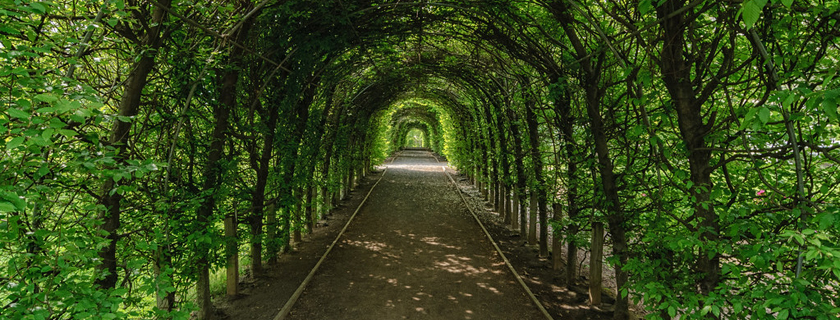Think you need to travel to Florence, or China to experience the classical splendor of its rich cultural history and architecture? Or, do you sometimes wish you could time travel to the 19th Century, a time when the arts and architecture in America seemed to hold the promise of an ideal and prosperous future? Well, you don’t have to travel far or wish beyond one of New York City’s five boroughs. Such treasures are alive and present at the Snug Harbor Cultural Center and Botanical Garden of Staten Island, an 83-acre campus dedicated to classical gardens, and to Greek revival architectural and decorative styles. For starters, the campus boasts two historically inspired gardens among its marquis attractions: the New York Chinese Scholar’s Garden and the Richmond County Savings Fund Tuscan Garden, both of which are inspired replicas of their native heritage counterparts.
Ming Dynasty gardens
TheNYCSG is composed of a hybrid of a small variety of classical structures based on the Ming Dynasty gardens (1368-1644 AD). It consists of eight pavilions and a continuous flow of garden landscaping constructed with native stone and wood from Suzhou, China. The elegant corridors and walking bridges traverse lyrical waterfalls and pass along bamboo paths decorated with inspired calligraphy and poetic passages from various Eastern traditions, Buddhist, Confucian, and Taoist. Aside from elegantly sculpted window art and elegantly crafted columns, one can gaze upon high standing stone sculptures that direct one’s gaze upward through the open-air vista of the complex. Of all its features, the most breathtaking is a portal known as the Moon Gate of Uncommon Beauty that will transport the visitor across space and through time upon crossing its threshold.
The second most striking feature of the SHCCBG is the RCSF Tuscan Garden modeled after the Villa Gamberaia in Florence, Italy which was constructed in the 1600s. Its terra cotta hues overlook long elegant terraces lined with olive and lemon trees indigenous to the Tuscan landscape and trimmed with finely manicured flora including roses and lilies. Its feature landmark is an amphitheater hosting a statue of the Roman fertility goddess, Ceres, nuanced by the meditative trickling of Renaissance fountains.
The variety of gardens seem never-ending as the campus unfolds upon further exploration leading visitors to Connie Gretz Secret Garden, the White Garden, the Rose Garden, the Healing Garden, The Allée, and the Perennial Garden. The array of options each highlight a particular historical period and style. The Allée, for example, presents a series of canopied walkways in the French-Italian style known as pleaching, where young shoots are guided to interlace overhead forming a canopied passageway. The Connie Gretz Secret Garden, named after the children’s book The Secret Garden, consists of a shrubbery maze, framed by a brick wall with three fantasy-like towers that one enters along a stone path: a perfect venue for children to frolic and play hide and seek on a summer afternoon. It also offers a “Storytime” event on select scheduled days. The Connie GertzSecret Garden has limited hours on Sundays from 10-4 through August 26th and has a small entrance fee of $3-$5.
But it doesn’t end there. If these two attractions aren’t enough to quell your cultural and travel bug, you might want to stay for the evening and watch a performance at the 686 seats, 19th Century Music Hall, a chamber whose acoustics will rival even the most renowned venues in the Northeast. Constructed in the 1890s, the brick building immediately impresses upon approach with its majestic ionic colonnade andfaçade. The auditorium blends both Greek and Roman traditional décor and the proscenium arch stands as a decorative ode to Orpheus, the Greek God of music. Among its most notable concerts, nine-time Grammy winner Norah Jones performed there in May of 2012 to kick off Snug Harbor’s 120th anniversary.
If a concert hall is less your style, then stroll over to the Newman Center for Contemporary Art located in buildings C and G which consists of three distinct galleries. The Main Hall’s clerestory windows and reflective rotunda will thrill your senses in a bath of sunlight while accentuating topical murals and refined woodwork. Designed by MinardLefevre (1798-1854), an inscription upon entry echoes the structure’s legendary purpose as a place of solace for “aged, decrepit, and worn-out sailors.” Within, one is immediately infused with the nautical themes for which the entire complex was dedicated. Variations in the clerestory and stained glass with blue glass etchings reveal navigational themes including constellations, ships, lighthouses, and seafaring instruments. As one looks up and across the expanse at images of Neptune, the God of the Sea, one also finds one’s feet firmly grounded on hardwood floors secured by a nautical compass that must have surely given forlorn sailors a sense of belonging.
The Main Hall along with the Commons Gallery, and the SHARP Gallery offer installations, exhibits, and museum tours, not to mention after-hours music acts to cap off a full day on the campus. However, one of its most intriguing experiences is the guided tour which goes beyond history into the realm of legend and folklore including haunting accounts of alleged ghost presences from days of old. All of this is offered by delightful and courteous staff. Entry to Newman Center admission is $5 ($4 for students/seniors) and free for Snug Harbor Members and children ages 6-12.
The Snug Harbor Botanical Garden website provides a thorough composite of its venues with visitor hours and fees. It also hosts a schedule of events throughout the summer along with educational and performance workshops for young adults throughout the year. The SHBG is accessible through public transportation via the Staten Island Ferry and a quick bus ride on the S 40, or, the S 44 lines. By car, take 278 to the Richmond Road/Clove Road exits coming from either the east or the west and follow Richmond terrace to the cast-iron front gates where free parking is available. The entire complex is wheelchair accessible and visitors are encouraged to contact staff for special accommodations, (718) 816-9691.

